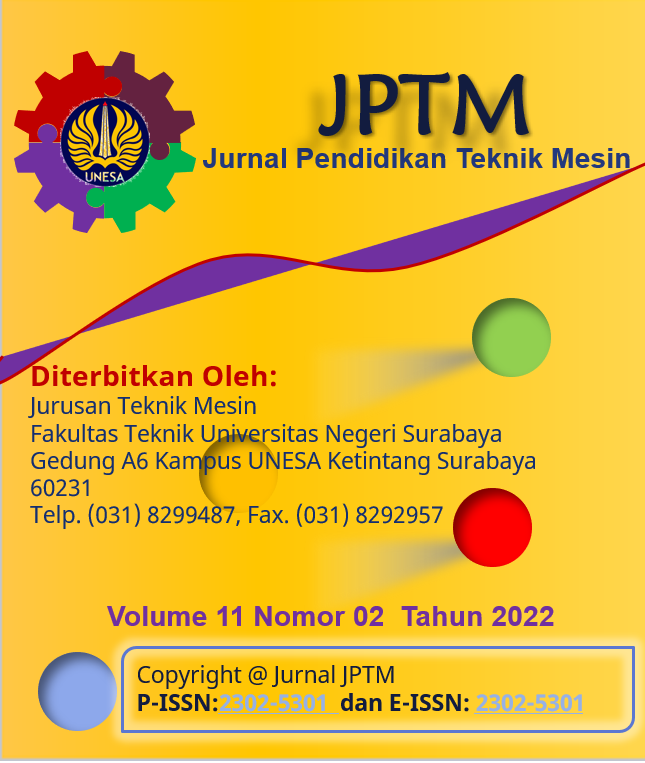PENGEMBANGAN MODUL PEMBELAJARAN CNC MILLING MENGGUNAKAN SOFTWARE MASTERCAM X9 PADA MATA PELAJARAN CNC DI JURUSAN TEKNIK PEMESINAN SMKN 1 BLITAR
DOI:
https://doi.org/10.26740/jptm.v11n02.p1-6Keywords:
Modul, Mastercam X9, Model 4D, Validitas, ResponAbstract
Abstrak
Melibatkan modul dalam proses pembelajaran merupakan salah satu cara dalam meningkatkan kualitas pembelajaran terhadap siswa. Penelitian pengembangan ini bertujuan untuk mengetahui proses dalam penyusunan modul pembelajaran, mengetahui kelayakan modul, respon siswa, respon guru, dan hasil belajar siswa terhadap modul yang telah dikembangkan. Metode penelitian menggunakan Research and Development (R&D) dengan pengembangan modul menggunakan 4-D model. Subjek penelitian yaitu siswa kelas XII TPM 1 SMKN 1 Blitar sebanyak 33 siswa. Modul mendapatkan kelayakan dari tiga aspek materi, bahasa, dan desain dengan nilai rata-rata 84,4% kategori sangat layak. Respon siswa terhadap modul terdiri dari tiga aspek yaitu tampilan, penyajian materi, dan manfaat memperoleh nilai rata-rata sebesar 89,42% tergolong dalam kategori sangat baik. Respon guru mata pelajaran CNC mendapatkan nilai rata-rata 91,11% kategori sangat baik. Berdasarkan perhitungan uji N-Gain didapatkan hasil sebesar 0,5531 yang berarti hasil belajar siswa mengalami peningkatan dengan kategori sedang. Dapat diambil kesimpulan bahwa modul CNC milling menggunakan software mastercam X9 layak diterapkan dalam proses pembelajaran pada mata pelajaran CNC di jurusan teknik pemesinan.
Kata Kunci: Modul, Mastercam X9, Model 4D, Validitas, Respon
Downloads
References
1. Arsyad, A. (2011). Media Pengajaran. Jakarta: Raja Grafindo Persada.
2. DEPDIKNAS. (2008). PENULISAN MODUL. Jakarta: Depdiknas.
3. Hardani, S., & dkk. (2020). METODE PENELITIAN KUALITATIF & KUANTITATIF. Yogyakarta: CV. Pustaka Ilmu Group Yogyakarta.
4. Indonesia, R. (2003). Undang-Undang RI Nomor 20 Tahun 2003 tentang Sistem Pendidikan Nasional. Republik Indonesia.
5. Munadi, & Yudhi. (2008). Media pembelajaran sebuah pendekatan baru. Jakarta: Gaung Persada Press.
6. PMPTK, D. (2008). Penulisan Modul Direktorat Tenaga Kependidikan. Jakarta: Ditjen PMPTK.
7. Riduwan, & Akdon. (2015). Rumus dan Data dalam Analisis Statistika. Bandung: Alfabeta.
8. Sugiyono, P. D. (2013). METODE PENELITIAN KUANTITATIF, KUALITATIF, DAN R&D. Bandung: ALFABETA BANDUNG.
9. Thiagarajan, & Sivasailan. (1974). Instructional Development for Training Teachers of Exceptional Children. Minneapolis: Indiana University Bloomington Indiana.
Downloads
Published
Issue
Section
 Abstract views: 417
,
Abstract views: 417
, PDF Downloads: 347
PDF Downloads: 347





